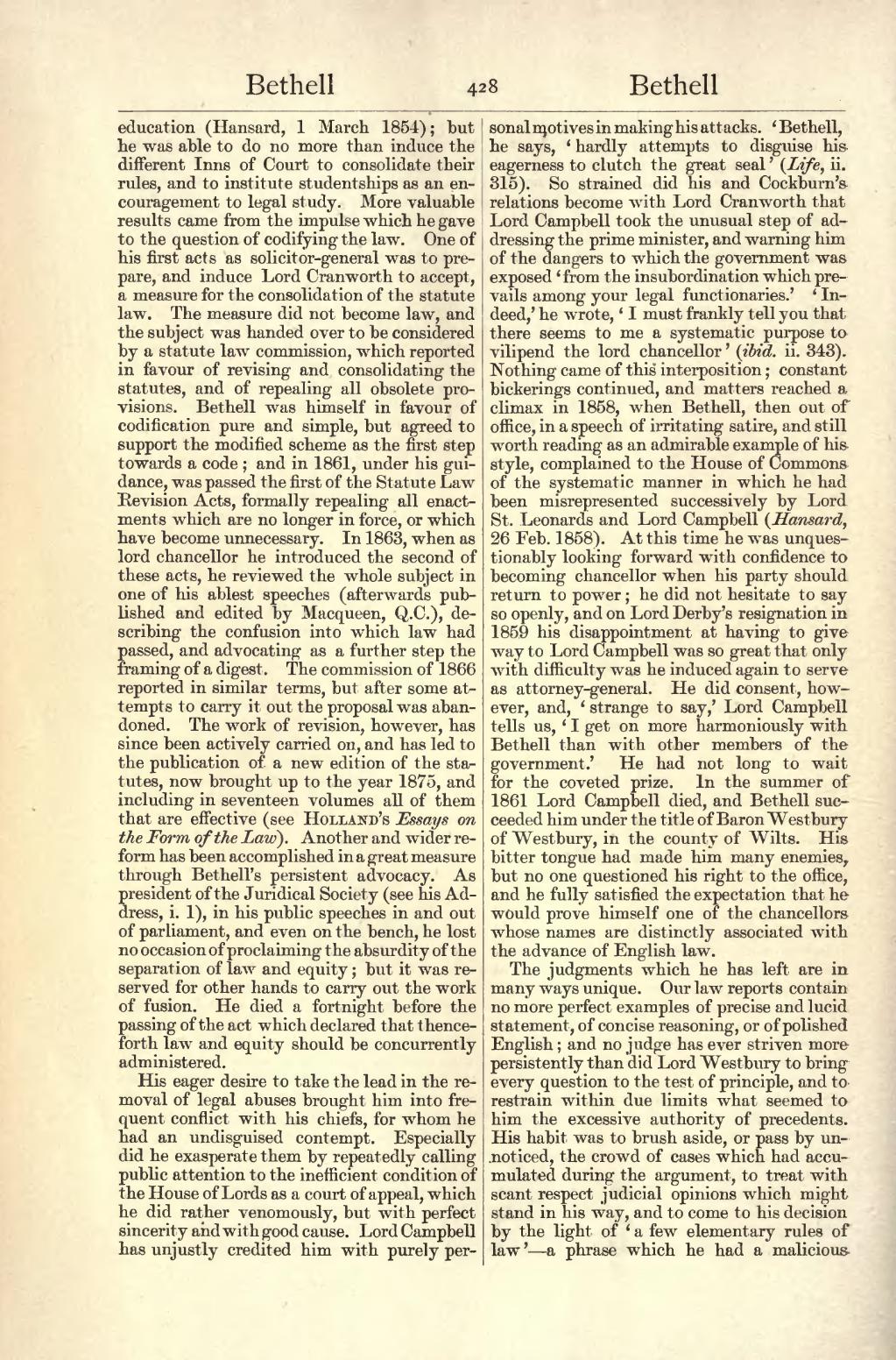education (Hansard, 1 March 1854); but he was able to do no more than induce the different Inns of Court to consolidate their rules, and to institute studentships as an encouragement to legal study. More valuable results came from the impulse which he gave to the question of codifying the law. One of his first acts as solicitor-general was to prepare, and induce Lord Cranworth to accept, a measure for the consolidation of the statute law. The measure did not become law, and the subject was handed over to be considered by a statute law commission, which reported in favour of revising and consolidating the statutes, and of repealing all obsolete provisions. Bethell was himself in favour of codification pure and simple, but agreed to support the modified scheme as the first step towards a code; and in 1861, under his guidance, was passed the first of the Statute Law Revision Acts, formally repealing all enactments which are no longer in force, or which have become unnecessary. In 1863, when as lord chancellor he introduced the second of these acts, he reviewed the whole subject in one of his ablest speeches (afterwards published and edited by Macqueen, Q.C.), describing the confusion into which law had passed, and advocating as a further step the framing of a digest. The commission of 1866 reported in similar terms, but after some attempts to carry it out the proposal was abandoned. The work of revision, however, has since been actively carried on, and has led to the publication of a new edition of the statutes, now brought up to the year 1875, and including in seventeen volumes all of them that are effective (see Holland's Essay's on the Form of the Law). Another and wider reform has been accomplished in a great measure through Bethell's persistent advocacy. As president of the Juridical Society (see his Address, i. 1), in his public speeches in and out of parliament, and even on the bench, he lost no occasion of proclaiming the absurdity of the separation of law and equity; but it was reserved for other hands to carry out the work of fusion. He died a fortnight before the passing of the act which declared that thenceforth law and equity should be concurrently administered.
His eager desire to take the lead in the removal of legal abuses brought him into frequent conflict with his chiefs, for whom he had an undisguised contempt. Especially did he exasperate them by repeatedly calling public attention to the inefficient condition of the House of Lords as a court of appeal, which he did rather venomously, but with perfect sincerity and with good cause. Lord Campbell has unjustly credited him with purely personal motives in making his attacks. ‘Bethell,’ he says, ‘hardly attempts to disguise his eagerness to clutch the great seal’ (Life, ii. 315). So strained did his and Cockburn's relations become with Lord Cranworth that Lord Campbell took the unusual step of addressing the prime minister, and warning him of the dangers to which the government was exposed ‘from the insubordination which prevails among your legal functionaries.’ ‘Indeed,’ he wrote, ‘I must frankly tell you that there seems to me a systematic purpose to vilipend the lord chancellor’ (ibid. ii. 343). Nothing came of this interposition; constant bickerings continued, and matters reached a climax in 1858, when Bethell, then out of office, in a speech of irritating satire, and still worth reading as an admirable example of his style, complained to the House of Commons of the systematic manner in which he had been misrepresented successively by Lord St. Leonards and Lord Campbell (Hansard, 26 Feb. 1858). At this time he was unquestionably looking forward with confidence to becoming chancellor when his party should return to power; he did not hesitate to say so openly, and on Lord Derby's resignation in 1859 his disappointment at having to give way to Lord Campbell was so great that only with difficulty was he induced again to serve as attorney-general. He did consent, however, and ‘strange to say,’ Lord Campbell tells us, ‘I get on more harmoniously with Bethell than with other members of the government.’ He had not long to wait for the coveted prize. In the summer of 1861 Lord Campbell died, and Bethell succeeded him under the title of Baron Westbury of Westbury, in the county of Wilts. His bitter tongue had made him many enemies, but no one questioned his right to the office, and he fully satisfied the expectation that he would prove himself one of the chancellors whose names are distinctly associated with the advance of English law.
The judgments which he has left are in many ways unique. Our law reports contain no more perfect examples of precise and lucid statement, of concise reasoning, or of polished English; and no judge has ever striven more persistently than did Lord Westbury to bring every question to the test of principle, and to restrain within due limits what seemed to him the excessive authority of precedents. His habit was to brush aside, or pass by unnoticed, the crowd of cases which had accumulated during the argument, to treat with scant respect judicial opinions which might stand in his way, and to come to his decision by the light of ‘a few elementary rules of law’—a phrase which he had a malicious fondness for using
